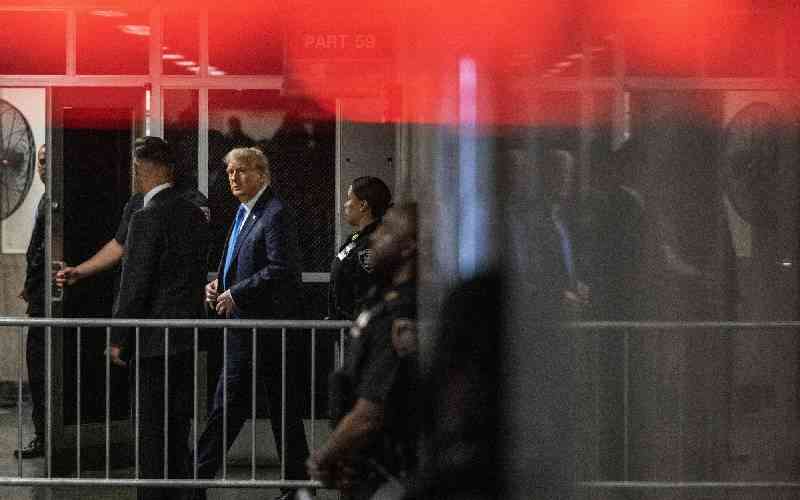
A friction between moneyed people, “old money” and “new money” gentries, is taking centre stage.
Those who made money generations ago, in colonial times or at the time of independence, become “old money” and tend to act as the custodians of the State.
Each generation generates new crops of money makers who gradually mature into lower layers of “old money” gentry, moving up the snobbery ladders.
Since “new money” moving up is essentially a challenge to existing old money, the process can entail serious socio-political conflicts.
At present, Kenya appears to be going through the pattern of “old money” and “new money” fighting for prominence. It baffles Wanjiku.
France replaying?
It is additionally baffling when senior State officials accuse the State of being at war with its people.
There appears to be combinations of three worrying characteristics that are similar to those of pre-Revolutionary France.
First; there are perceptions of over taxed commoners. Second, the gentry overspend public resources, without corresponding income, and plunge the country into deep debts.
Third; there is an arrogant Marie Antoinette do-not-care attitude about the plight of the commoners.
All that Wanjiku sees, then, is a tableau of members of “old money” and “new money” trading abuses while partaking of limited national resources without in the care.
The arrogance among members of “old money” gentry is probably because they have solid colonial foundations and were prominent at the time of independence.
Some had been good colonial “Humble and Obedient” servants, having attended trade and teacher schools and assorted high schools culminating at Makerere or Fort Hare or some universities outside Africa.
Before, and at, independence, they were ministers, members of the LegCo and Parliament.
Stay informed. Subscribe to our newsletter
They acquired, from the departing settlers and colonial officials, wealth as well as imperial socio-cultural mannerisms and graces.
Their children went to previous mzungu-only secondary schools where they were properly oriented to speak English with proper diction, nuances, and intonations.
This generation of independence “old money” gentry consolidated colonial structures and mentality so well that it was accused of pandering to neo-colonialism which meant that, although they became individually rich, they did not add to real national wealth.
It became subject to castigation by social critics such as musician Joseph Kamaru.
Since “old money” gentry still runs the country, in its perceived interests, there is socio-political dissonance partly because “new money” men want to bulldoze themselves into acceptance as gentry.
They rule the world
It runs the country in part because its children, the next generation of “old money” gentry, took control of national institutions.
Occasionally they quarrel as to who is more “radical” or “gentry” than the others and accommodate a few “new money” players. This new money clique tends to be innovative in business, finance, and entrepreneurship.
Although members try to ingratiate themselves to sections of old money, they lack the British cultural finesse.
These make financial and business waves with political implications despite their pedigree shortcomings.
It became impossible to ignore such bulldozers into the gentry club because they wield media or financial clout. They are tolerated intruders as long as they keep their social distance.
Some old money players adopted a raiding mentality and pauperization strategy that ended up depleting national wealth.
They became extremely rich as individuals while pauperizing institutions and perceived rivals.
In the 1980s, members of old money fought each other and even encouraged selected non-gentry to acquire money in strange ways.
Among the strange ways was the export and receiving of “rebates” from the Exchequer for non-existing commodities.
This went hand in hand with the destruction of wealth producing activities like cotton, coffee, pyrethrum, tea, and nascent manufacturing industries.
In turn, the destruction of wealth creation affected and tended to pauperize targeted members of “old money” gentry who then went into rebellion hence the “Second Liberation.”
The Second Liberation, a feud among the gentry, hoodwinked Wanjiku into thinking she was liberated.
New money men came up, and Wanjiku found herself, caught in-between old money gentry and new money gentry.
She is in the same position as she was in the late 1980s and early 1990s in which members of the old and the new money keep trading accusations as to who, among the competing gentry, is making the country poorer than the other.
As a result, there is increasing talk of Third Liberation. It is still about old money and new money gentry, competing.
Prof Munene teaches History and International Relations at USIU
 The Standard Group Plc is a
multi-media organization with investments in media platforms spanning newspaper
print operations, television, radio broadcasting, digital and online services. The
Standard Group is recognized as a leading multi-media house in Kenya with a key
influence in matters of national and international interest.
The Standard Group Plc is a
multi-media organization with investments in media platforms spanning newspaper
print operations, television, radio broadcasting, digital and online services. The
Standard Group is recognized as a leading multi-media house in Kenya with a key
influence in matters of national and international interest.
 The Standard Group Plc is a
multi-media organization with investments in media platforms spanning newspaper
print operations, television, radio broadcasting, digital and online services. The
Standard Group is recognized as a leading multi-media house in Kenya with a key
influence in matters of national and international interest.
The Standard Group Plc is a
multi-media organization with investments in media platforms spanning newspaper
print operations, television, radio broadcasting, digital and online services. The
Standard Group is recognized as a leading multi-media house in Kenya with a key
influence in matters of national and international interest.









